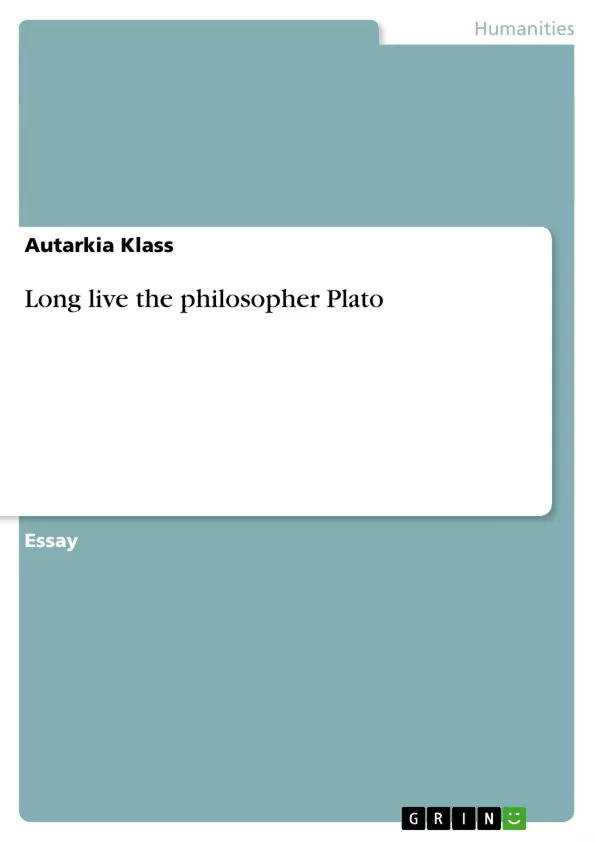All are lunatics, but he who can analyze his delusion is called a philosopher.'
Once Ambrose Bierce's 'The Devil's Dictionary' delivered this momentous insight, I totally acknowledge to be true. You probably wonder in how far this quotation is relevant for the present issue and how I can agree on a statement undermining the human's ratio-the quality we are so incredibly proud of, the quality that seems to tell the difference between us humans and animals? You will have your answer at the end of the following essay.
Inhaltsverzeichnis (Table of Contents)
- Introduction
- Plato's Idea of Philosopher-Kings
- Philosophers and Their Strengths
- The Importance of Reason and Wisdom
- Human Insanity and its Manifestations
- The Insufficiency of Utilitarianism
- The Gender Bias in Philosophy
- The Skepticism of Philosophers and its Practical Consequences
- The Relevance of Philosophy in Modern Society
- Conclusion: The Complexity of Philosopher-Kings
Zielsetzung und Themenschwerpunkte (Objectives and Key Themes)
This essay examines Plato's assertion that an ideal society needs to be governed by a council of philosopher-kings. It analyzes the strengths of philosophers, the nature of human insanity, and the challenges of implementing a philosophical approach to governance.- The role of philosophy in shaping a just and equitable society
- The inherent limitations of human reason and the potential dangers of unchecked progress
- The complexities of applying philosophical principles to real-world political and social issues
- The potential dangers of utilitarianism and its implications for moral decision-making
- The importance of considering diverse perspectives and avoiding biases in governance
Zusammenfassung der Kapitel (Chapter Summaries)
The essay begins by introducing Plato's idea of philosopher-kings and identifying the core qualities that make philosophers uniquely suited for leadership, such as their analytical abilities, their pursuit of wisdom, and their constant questioning. It then explores the concept of human insanity, arguing that our history is filled with examples of irrational behavior, such as wars and the death penalty. The essay then delves into the challenges of implementing a philosophical approach to governance, using utilitarianism as an example. It argues that utilitarianism, while aiming for the greatest good for the greatest number, can lead to morally questionable decisions by prioritizing outcomes over values. Further arguments against a philosopher-king government are presented, including the gender bias in philosophy and the potential for excessive skepticism to hinder practical action. The essay concludes by emphasizing the need for philosophical influence in navigating complex modern issues such as genetic engineering while acknowledging the complexities and limitations of applying philosophy directly to governance.Schlüsselwörter (Keywords)
This essay explores the main keywords and topics of Plato's idea of philosopher-kings, human insanity, the complexities of applying philosophical principles to governance, the insufficiency of utilitarianism, and the relevance of philosophical influence in modern society. The core concepts covered include analytical abilities, wisdom, skepticism, progress, and the challenges of balancing reason and practicality in decision-making.Frequently Asked Questions
What is Plato's concept of "Philosopher-Kings"?
Plato argued that an ideal society should be governed by philosophers because their pursuit of wisdom, analytical abilities, and use of reason make them uniquely suited to lead justly.
What are the main strengths of a philosopher as a leader?
Philosophers are characterized by their constant questioning, their ability to analyze delusions, and their prioritization of wisdom over personal gain or irrational impulses.
Why does the essay mention "human insanity"?
The author uses "human insanity" to describe irrational historical behaviors like wars and the death penalty, suggesting that a lack of philosophical reason leads to societal delusions.
What is the critique of utilitarianism in governance?
The essay argues that utilitarianism can be insufficient because prioritizing the "greatest good for the greatest number" might lead to morally questionable decisions that ignore fundamental values or individual rights.
How relevant is Plato's philosophy in modern society?
Philosophy remains crucial for navigating complex modern dilemmas, such as the ethics of genetic engineering, where technical progress must be balanced with deep moral reflection.
Is there a gender bias in traditional philosophy?
Yes, the essay acknowledges that historical philosophy often suffered from gender bias, which is a challenge when trying to apply these ancient principles to modern, equitable governance.
- Citation du texte
- Autarkia Klass (Auteur), 2012, Long live the philosopher Plato, Munich, GRIN Verlag, https://www.grin.com/document/233479



